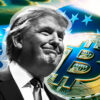But the protests were about more than the nation’s new law making Bitcoin legal tender.
El Salvador residents took to the streets on September 15, the country’s independence day, to protest Nayib Bukele’s presidency — including his administration’s move to make bitcoin legal tender. Thousands attended the protests, according to several media outlets including the BBC.
Video footage tweeted by the newspaper La Prensa Gráfica shows a burning structure in the center of San Salvador that reportedly housed a Chivo bitcoin ATM, raising questions about who set the blaze. The protests took place on the 200th anniversary of the day El Salvador and several other Central American countries declared independence from Spain.
But María Ramírez, a San Salvador resident who attended the protest, told The Block that the overall atmosphere in the city center was peaceful. According to Ramirez, people from all walks of life and social classes attended the protests, including many young people.
The protest follows smaller demonstrations against El Salvador’s new bitcoin law, which went into effect on Sept. 7 and makes the cryptocurrency legal tender in the country alongside the U.S. dollar. According to an article in El País, Bukele has accused the “international community” of being behind the most recent protests.
Not only about Bitcoin
But while El Salvador’s new Bitcoin law has dominated international media coverage of the small Central American country, it’s not the only reason people have been protesting Bukele.
While 40-year-old Bukele is undeniably a popular president, his opponents have accused him of authoritarianism. They worry about a lack of transparency when it comes to his administration’s plans to increase the size of the military and revamp the constitution. These concerns have only intensified following the dismissal of several top judges in favor of new ones who have ruled that presidents can now serve two terms in a row.
According to Ramírez, the protests also had to do with people being unhappy about a big focus on bitcoin adoption instead of other issues like education and healthcare.
Even though the government has said repeatedly that individuals don’t need to use bitcoin if they don’t want to, some view the law making it legal tender as an imposition. Some citizens are also worried about the possibility of corruption and money laundering, Ramírez said, since El Salvador was the first in the world to make bitcoin legal tender.
While Bukele has said that individuals are not required to use Bitcoin, businesses that have access to the proper technology need to accept it as a payment method. Companies should be able to automatically liquidate funds using the government’s Chivo wallet, but some business owners are still worried about the possibility of losing money on bitcoin payments due to the currency’s volatility.
Since Bukele announced the bitcoin plan at a Miami conference just over three months ago, many Salvadorans still have unanswered questions about what Bitcoin is and how to use it. Those doubts have only been exacerbated by the technical problems with the launch of the Chivo wallet.
“Nothing is clear about bitcoin,” Ramírez said.
theblockcrypto















































